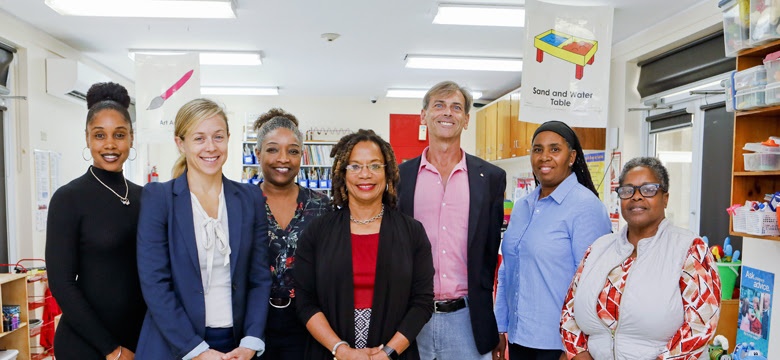Minister Announces Child Care Regulations programme

Good morning,
Thank you for coming this morning as we recognize UNICEF’s World Children’s Day on 20th November, which is the annual day of action for children.
This year marks 30 years of the Convention of the Rights of the Child – which means 30 years of child rights that have helped transform children’s lives around the world.
The principles in the Convention include, among others, non-discrimination, the best interest of the child as a primary consideration in all actions concerning the children, and the state’s obligation to assure the safety and development of children.
It gives me great pleasure in recognition of this milestone, to share with you the many actions the Ministry of Health has been engaged in, and the steps we will be taking, to ensure the rights, safety, health and development of our children is being secured.
Our children are some of the most vulnerable persons in our community. The early years of a child’s life and the experiences they have are critical to their emotional, mental and physical development and wellbeing.
Department of Health professionals are dedicated to ensuring that infants and toddlers are cared for in environments where they can reach their developmental milestones and make progress in life skills. When our young children thrive, our society thrives.
The persons providing care to our children in child care settings – both day care centres and in homes – are key to supporting our children’s growth.
These dedicated professionals spend anywhere from 8 to 10 hours a day and 50 weeks a year caring for our children. They are extremely important to the future development of our children and of Bermuda.
That’s why the Department of Health has made this sector a priority and enhanced its programme to oversee and promote quality and best standards in day care settings. The programme has enhanced its capacity to provide the support, education and oversight these settings, and our children, deserve and need.
With a combined background in early childhood education, social work and day care experience, the team is well positioned to provide support to the learning environment, while also ensuring compliance with our laws.
The programme has increased visits to all child care settings and placed a focus on the curriculum and development of the children, not just health and safety. This approach is based on best practice in different jurisdictions and on documented incidents that have occurred locally.
While the majority of day care centres and providers deliver loving, supportive care to our children, historically there have been some tragic incidents that we never want to see repeated. As a Ministry, we take a zero-tolerance approach when it comes to the safety of our children.
However, we also need parents’ help. You can support your child’s centre or provider to help ensure that all children in day care enjoy good quality standards. These are some steps you can take:
1. Make sure your Day Care Centre or Day Care Provider is licenced or registered with the Department of Health. If the setting you use is not compliant, please encourage them to register with us. Each Day Care Centre receives a licence and the home-based Day Care Providers receive a Certificate of Registration. If you are unsure whether they have one, please ask to see it; they should have it on display.
2. If you have concerns with your Centre or Provider, always address it with them directly in the first instance – the vast majority of concerns are best dealt with directly. However, if your concern about is not addressed, contact the child care team at the Department of Health, who will investigate care quality concerns. You are in these settings every day, so your perspective is important. The child care team can be reached on 278-4900 or at childcare@gov.bm.
3. The number of children to the number of staff in a Centre or Day Care Provider is critical. If a home-based Day Care Provider has more than 3 children they are breaking the law. Day Care Centres have ratios based on children’s ages. The ratios are published on our website at www.gov.bm/child-care-information-parents. Generally, younger children must be in smaller groups than older children, as younger children require more adult care.
The number of children to staff is critical to their health, safety and development. If the ratios are correct, the caregivers can attend to the unique needs of each child. Importantly, the ratios and group sizes are designed so that caregivers can respond quickly and adequately in case of any emergency. The children to staff ratio is one of the most important aspects of quality child care in any setting.
Of critical importance is also the education and support of professionals who care for children. That is why a key component of the programme is education. We work with day care centre staff to support capacity building programmes and ensure continuing professional development. We also encourage the creation of education programmes on the island.
To end, I want to remind us all that early childhood education is not “just” babysitting. It is a valued and respected vocation and should be seen as a future career opportunity for Bermudians. We want to raise the bar for both our children and our professional care givers.
So, in recognition of 30 years of the rights of the child, I am very proud of the significant enhancements we have seen in the child care sector, and I am grateful to all stakeholders for their collaboration to develop, educate and assure the safety of our children.
Thank you
Photo attached: Members of Department’ of Health's Child Care Regulation team with Minister Kim Wilson (from left to right): Denika Hollis, Robyn Skinner, Michelle Hasselle, Minister Kim Wilson, David Kendell, Penny Saltus, and Judith Brooks.